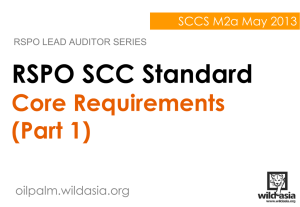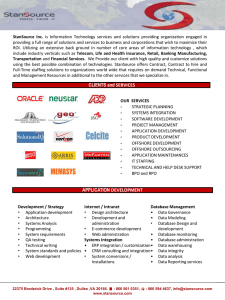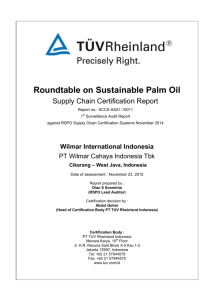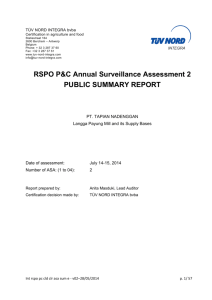03_M2b SCCS The Standard Part2_May2013
advertisement
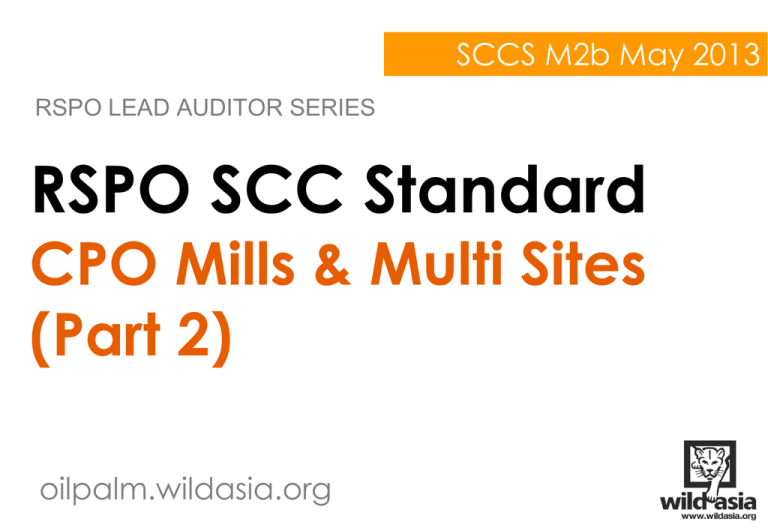
SCCS M2b May 2013 RSPO LEAD AUDITOR SERIES RSPO SCC Standard CPO Mills & Multi Sites (Part 2) oilpalm.wildasia.org RSPO Supply Chain Certification Standard 1. CPO Mills a. SG Module b. MB Module 2011 2. MULTI-SITE CERTIFICATION a. System Requirements b. Standard Requirements SCC Standard 1. CPO Mills CPO Mills • CPO SCCS will be determined during a P&C Audit. The following needs to be verified: • Volumes of FFB inputs and volumes of RSPO sales outputs • Estimated production of CPO/PK and recorded in certificate. Certified volume cannot exceed this. Subsequent ASA will update actual figures. • Mill meets registration & reporting requirements as per UTZ or Greenpalm and e-Trace. SEGREGATION D – SG CPO Mill Segregation ensures receipt, processing and storage maintains RSPO products is physically separated Outgoing documentation identifies Certified product, e.g., CPO SG Certificate XXXXXX Source of Certified Material is identified & verified Documented systems in place to control mixing • Procedures for receiving and processing certified and non-certified FFBs. Documented Procedures • Verify & document volumes of certified and noncertified FFB received. • Inform CB immediately if there is an overproduction. Purchasing and Goods In • Records and reports for at least 5 years • Record and balance all receipts of RSPO certified FFB and deliveries of CPO, PKO and palm kernel meal on a three-monthly basis. • Trade names shall be indicated on relevant documents (e.g., purchase and sales contracts): • [Product Name]/SG or Segregated Record Keeping • Sales invoices or relevant documents (e.g. delivery notes, shipping documents, etc) includes sufficient information on RSPO certified palm oil products delivered. • Names/Contacts of buyer • Date invoice issued • Certified product description (MB/SG) • Quantities delivered • Reference to Transportation information Sales of Goods Out • 100-95% of source is identifiable to only certified segregated source. • Demonstrate (inc. procedures & record keeping) segregation: • Prevents physical mixing (isolated) • Transport and Storage Processing • Mill may outsource to an independent PK crushing mill and does not need to be independently certified. But: • Crusher conforms to SG requirements; • Crusher is included in an enforceable agreement. Processing MASS BALANCE E – MB CPO Mill Facilities utilizes certified and non-certified materials in the process. There is no segregation. Source of Certified Material is identified & verified Accounting System in place to monitor Certified volumes received and Certified products Outgoing documentation identifies Certified product, e.g., CPO MB Certificate XXXXXX Any physical sales of certified products are deducted from the Accounting System only. • Procedures for receiving and processing certified and non-certified FFBs. Documented Procedures • Verify & document volumes of certified and noncertified FFB received. • Inform CB immediately if there is an overproduction. Purchasing and Goods In • All volumes of products delivered shall be deducted from material accounting system based on the RSPO conversion ratio. • Facility can only deliver MB sales from positive stock and is allowed to short sell. Record Keeping • Records and reports for at least 5 years • Record and balance all receipts of RSPO certified FFB and deliveries of CPO, PKO and palm kernel meal on a three-monthly basis. • Trade names shall be indicated on relevant documents (e.g., purchase and sales contracts): • [Product Name]/MB or Mass Balance Record Keeping • Mill may outsource to an independent PK crushing mill and does not need to be independently certified. But: • Crusher conforms to SG requirements; • Crusher is included in an enforceable agreement. Processing • Sales invoices or relevant documents (e.g. delivery notes, shipping documents, etc) includes sufficient information on RSPO certified palm oil products delivered. • Names/Contacts of buyer • Date invoice issued • Certified product description (MB/SG) • Quantities delivered • Reference to Transportation information Sales of Goods Out MB Suppy Chain Yield Scheme SCC Standard 2. Multi-site Certification Central Office manages SCCS requirements RSPO Certificate issued to Central Office ICS defines how SCCS will ensure compliance Internal Audits at least 1/annum System Requirements Multi-site Certification The SCCS System defines the following elements; Eligibility Criteria for Operation Certification Units Audit Sampling Eligibility • All operations owned by same company • Centralised Office (CO) shall defined rules for eligibility of all participating sites • Multi-site audits can be across borders, as long as SCCS controlled by CO Criteria for Operation • • • • • SCC System managed centrally (CO) All facilities included = contract to CO CO manages a ICS CO elects a Management Rep CO is audited annually Criteria for Operation • Operations grouped into sets • Milling, Refining, Transport & Distribution, Processing, Production, Blending, Outsourcing (tanks, etc) Certification • Certificate issued to CO and relevant companies/operations listed • Certificate valid for 5 years with annual surveillance Audit Principles • Audits will consider Sets of facilities with common management systems • Audit rigor will be determined by an audit risk assessment Initial Assessment • CO + 0.8 x [Each Sets] where each Set = rounded up (√ total no of sites) Surveillance • CO + 0.6 x [Each Sets] where each Set = rounded up (√ total no of sites) Re-Certification • CO + 0.8 x [Each Sets] where each Set = rounded up (√ total no of sites) Audit Formula Example 1: Audit Formula Initial Assessment: 1 CO = once per year 4 mills = 0.8 x √ 4 = 1.6 = 2 10 refineries = 0.8 x √ 10 = 2.5 = 3 27 manufacturers = 0.8 x √ 27 = 4.2 = 4 i.e., total of 10 audits per annum Standard Requirements Multi-site Certification The SCCS Standard defines the following elements; Scope Responsibilities Training Record Keeping Internal Audits Claims • The Central Office needs to define: • Geographic area, the number & identify of facilities • Supply Chain model used and types of operations covered by the model Note: MB accounting can only be done at the facility level Scope • Operational units are part of the Central Office (CO) • CO to justify any sets or groupings of facilities • RSPO SCCS system: • Covered by an internal ICS • CO administers the ICS • CO defines a management rep to oversee compliance • CO defines a corrective action procedure where non compliance is detected • CO has the authority to remove participating sites from the RSPO SCCS scope (inc. RSPO CB findings) Responsibilities • ICS shall define training scope, requirements and implementation Training • CO maintains all records and reporting • ICS defines which common management documents are applicable for all units • ICS defines which specific documents are required to demonstrate compliance • ICS/CO maintains documents for min. 5 years Record Keeping • CO at least one internal audit of each site • (ICS) non conformance results in an issued corrective action request • Actions taken to close non conformance shall be made available • Outcomes of internal audit programme shall be reviewed by top management at least annually Internal Audits • ICS shall be responsible for ensuring all use by represented sites comply to the rules for market communication & claims. Claims SCC Standard Conclusion Conclusion • CPO Mills must adopt either SG or MB supply chain models. Their certification requirement is currently included within the scope of the Mill’s RSPO production certificate. • Multi-site certification is applicable generally for large multinational companies, operating many facilities. Questions? E: advisory@wildasia.org W: oilpalm.wildasia.org
